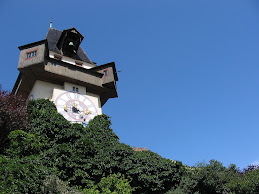In the past week or so, the whole world has been closely watching the criminal trial of an Amstetten man accused of rape, incest, forced imprisonment, enslavement, coercion, and negligent homicide. Nearly one year ago, we heard the shocking story of how he imprisoned his daughter, now 42, in a secret basement cell of his home when she was 18 and then fathered 7 children with her over the next 24 years. I don't want to dwell on the details of the crime, but I'd like to comment on how I've seen its treatment, both here in Austria and abroad.
As a little central European country that tends to evade the international spotlight, most U.S. Americans know Austria for its mountains, it's contribution to California's seat of Governor, and the timeless classic 1965 Julie Andrews musical it inspired. But recently this country has been thrust into the limelight for less flattering reasons.
It was only in 2006 that Austria was brought under the loop of the world's media for the case of Natascha Kampusch, a young woman who was abducted at the age of 10 and kept for 8 years in a secret basement cell of her captor's house until her escape. Austria was left troubled under the international scrutiny of the Natascha Kampusch case, so it comes as no surprise that is now deeply shaken with the case of the Amstetten man. This crime helps establish a precident in how the rest of the world perceives Austria: it is the country where young women are captured and kept in basements.
It's suprising that two such horrible crimes should occur in the same place at the same time. And it's unfortunate for Austria that it is now known for such things. You can sense Austria's sense of shame and embarrassment surrounding this matter, and it is clear that they'd prefer to earn their fame some other way. But coming from a country whose news media is splayed across every corner of the world, I have a hardened sense of sympathy for them.
As a foreigner from a world superpower living in this charming yet somewhat inwardly-focused nation, I find it hard to empathize. Nearly all of my three total years in Austria have been under the Bush administration. Did they ever get news of what America was doing right? Sure, our international as well as domestic politics have suffered a lot--but did they ever hear of anything good coming out of America? And during the past election, did both candidates receive equal and fair representation? Election news was streaming into Austria every day for months, but it was heavily biased towards Obama (i.e., the candidate whose party has no affiliation to Bush) both in content and in quantity. When my students consider an exchange year in the U.S., do they think about the extensive sports, clubs, and extracurricular activities not available to them in Austria or do they think about the danger of school shootings? I've learned to automatically apologize for my country in this culture; and it's a bad habit that simply reinforces the stereotypes brought on by bad news. Yes, Austria is making a bad impression on the rest of the world right now. But that kind of stuff comes out of my country all the time. How can they ask us not to judge them when they have a habit of judging us for the same thing?
Another phenomenon about the treatment of this case in Austria is that everything possible has been done here to protect the Amstetten man's identity. Known here as simply Josef F., not a single newspaper or news source I could find is revealing his last name. Yet all of the English-language media I've seen has provided his complete name. Indeed, even a Google search for "Josef Fritzl" yields largely English language results. The discrepancy extends as far as Wikipedia: the English-language entry on the case reveals his whole name, yet the German-language entry refers to him throughout the article simply as Josef F. It puzzles me why the Austrian media seeks to preserve anonymity when this information is readily available to the rest of the world. (N.b.: It's possible that this is some obscure law I know nothing about, but I cannot find any explanation for it in my Austrian sources. Even in the case of Kampusch, the captor's entire identity was known.)
In a surprising turn of events today, Josef F(ritzl) pleaded guilty to all charges. His sentence is expected tomorrow afternoon at the end of his four day trial. So, Austria, even though the rest of the world may be judging you by your atrocious crimes, maybe you're sending us a bit of hope as well...hope that one day we, too, will be able to conduct a major trial in only four days.
Wednesday, March 18, 2009
Subscribe to:
Post Comments (Atom)



No comments:
Post a Comment